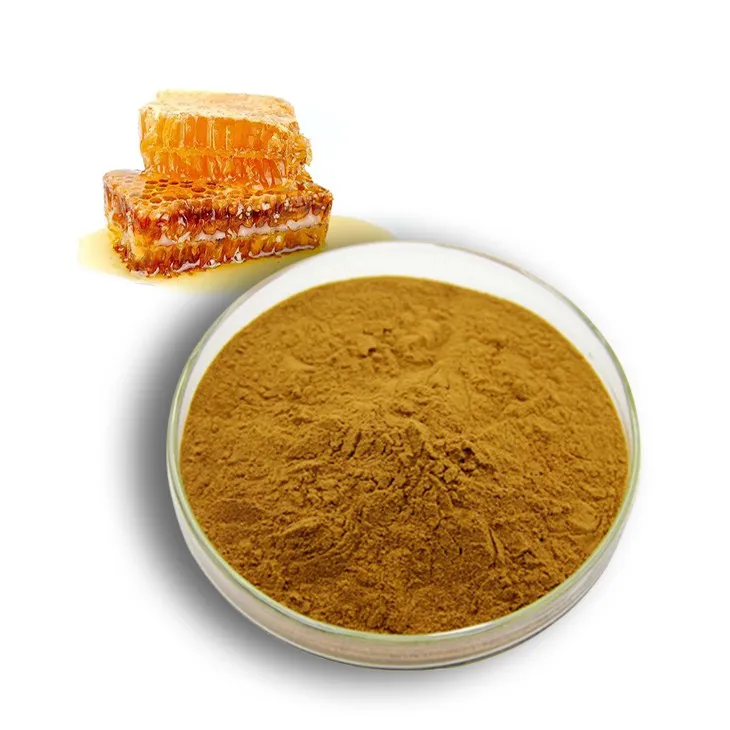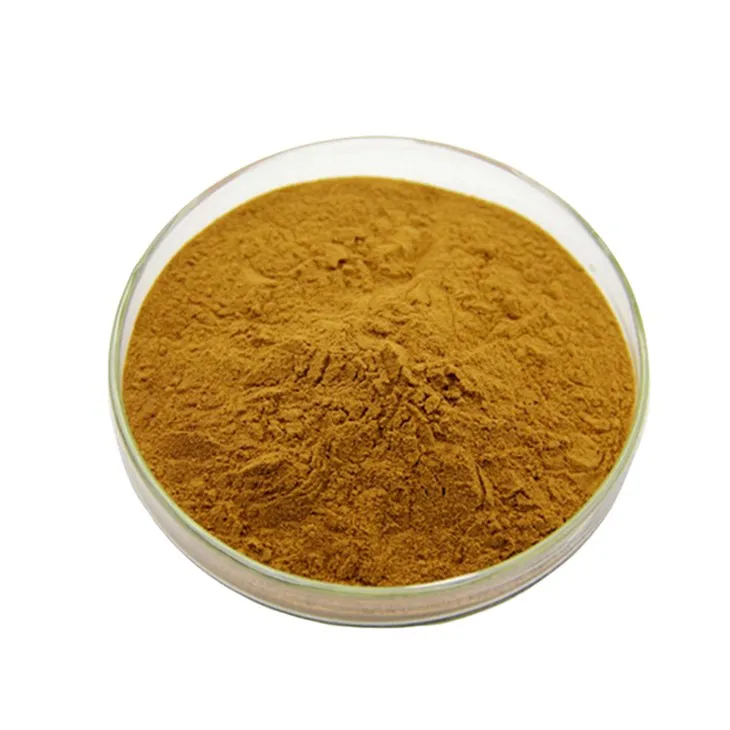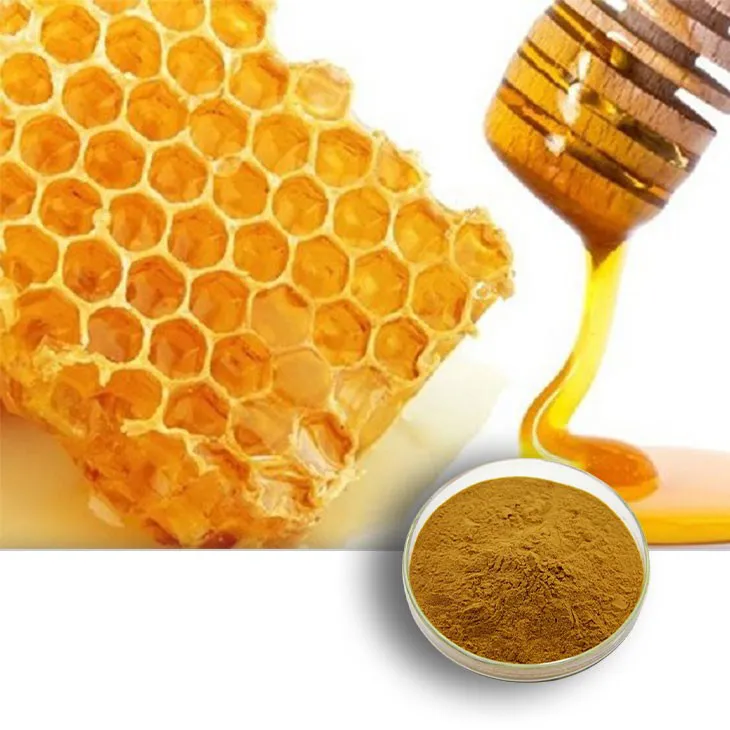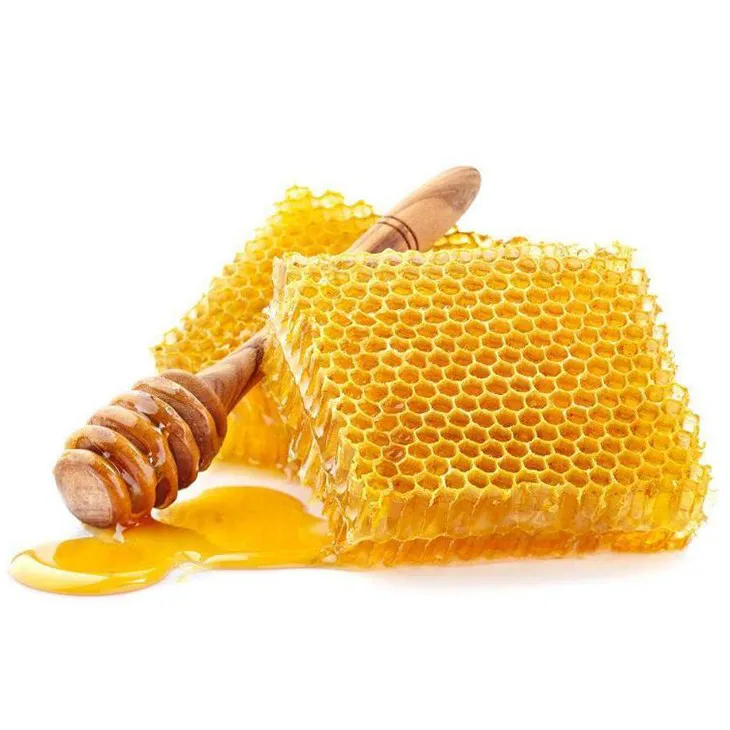- 0086-571-85302990
- sales@greenskybio.com
Components of Propolis Extract Powder in Fertilizers and Feeds.
2024-12-02

1. Introduction to Propolis Extract Powder
Propolis Extract Powder is a natural product that has been garnering increasing attention in recent years. It is derived from propolis, a resinous substance that bees collect from various plant sources and combine with their own enzymes and wax. Propolis has long been known for its antibacterial, antifungal, and antioxidant properties in traditional medicine. When processed into extract powder, it becomes more convenient for use in different applications, such as in fertilizers and feeds.

2. Propolis Extract Powder in Fertilizers
2.1 Nutritional Components
- Amino Acids: Propolis extract powder contains a variety of amino acids. These are the building blocks of proteins. In fertilizers, they can be beneficial for plants as they are involved in various physiological processes. For example, amino acids can enhance the plant's ability to synthesize enzymes and other proteins necessary for growth. Some amino acids, like lysine and methionine, are essential for plants, meaning they cannot be synthesized by the plant itself and must be obtained from external sources. The presence of these amino acids in propolis extract powder can supplement the plant's nutritional needs.
- Minerals: Minerals are crucial for plant development. Propolis extract powder may contain minerals such as potassium, calcium, and magnesium. Potassium is important for regulating water uptake and maintaining turgor pressure in plant cells. It also plays a role in photosynthesis and the activation of enzymes. Calcium is essential for cell wall formation and stability. It helps in preventing diseases and disorders related to cell structure in plants. Magnesium is a central component of the chlorophyll molecule, and thus is vital for photosynthesis. The presence of these minerals in propolis extract powder can contribute to better plant growth when added to fertilizers.
- Vitamins: Vitamins also play an important role in plant growth. Although plants can synthesize some vitamins on their own, the addition of external sources can still be beneficial. Propolis extract powder may contain vitamins such as vitamin C and some B - group vitamins. Vitamin C, for example, is an antioxidant that can protect plants from oxidative stress caused by environmental factors such as pollution and UV radiation. B - group vitamins are involved in various metabolic processes in plants, such as carbohydrate and amino acid metabolism.
2.2 Bioactive Compounds
- Flavonoids: Flavonoids are a major group of bioactive compounds in propolis extract powder. They have antioxidant, anti - inflammatory, and antimicrobial properties. In fertilizers, flavonoids can help plants to resist diseases. They can also enhance the plant's immune system by activating defense - related genes. For example, some flavonoids can stimulate the production of phytoalexins, which are antimicrobial compounds produced by plants in response to pathogen attack.
- Phenolic Acids: Phenolic acids in propolis extract powder also contribute to its bioactivity. They have antioxidant properties that can protect plants from free radical damage. Additionally, phenolic acids can improve soil fertility. They can interact with soil microorganisms, promoting the growth of beneficial bacteria and fungi. This, in turn, can enhance nutrient availability for plants as these microorganisms can break down organic matter and release nutrients in a form that plants can absorb more easily.
2.3 How These Components Function in Fertilizers
- Enhancing Nutrient Uptake: The amino acids, minerals, and vitamins in propolis extract powder can work together to enhance nutrient uptake by plants. For example, the presence of certain amino acids can increase the permeability of plant roots, allowing for better absorption of minerals from the soil. Vitamins can also be involved in the transport of nutrients within the plant.
- Stimulating Growth and Development: The bioactive compounds such as flavonoids and phenolic acids can stimulate plant growth and development. They can promote cell division and elongation, leading to increased plant height and biomass. For instance, flavonoids can regulate plant hormones such as auxins, which are involved in cell elongation.
- Disease Resistance: The antimicrobial properties of propolis extract powder can help plants to resist diseases. The flavonoids and phenolic acids can inhibit the growth of pathogenic microorganisms in the soil and on the plant surface. This reduces the incidence of plant diseases and can lead to healthier plants.

3. Propolis Extract Powder in Feeds
3.1 Nutritional Components
- Proteins and Amino Acids: In the feed industry, proteins are essential for animal growth and development. Propolis extract powder contains amino acids that can supplement the protein requirements of animals. For example, in poultry farming, the amino acids in propolis extract powder can be used to improve the quality of egg whites and yolks. In livestock, it can contribute to muscle development.
- Fatty Acids: Propolis extract powder may also contain some fatty acids. These can be beneficial for animals in terms of energy supply and cell membrane formation. For example, omega - 3 and omega - 6 fatty acids are important for maintaining good health in animals, especially in terms of reducing inflammation and improving reproductive performance.
- Vitamins and Minerals: Similar to plants, animals also require vitamins and minerals for proper functioning. Propolis extract powder can provide additional sources of vitamins such as vitamin A, D, and E, and minerals like zinc and selenium. Vitamin A is important for vision and immune function in animals, while vitamin D is essential for calcium absorption and bone development. Zinc and selenium are involved in various enzymatic reactions and antioxidant defense mechanisms in animals.
3.2 Bioactive Compounds
- Flavonoids: Flavonoids in propolis extract powder can have positive effects on animal health. They can act as antioxidants, protecting animals from oxidative stress. In the case of livestock, flavonoids can reduce the incidence of diseases related to oxidative damage, such as mastitis in cows. In poultry, they can improve the antioxidant status of eggs.
- Phenolic Acids: Phenolic acids also play a role in animal feeds. They can improve the digestibility of feed by interacting with the digestive enzymes in the animal's gut. This can lead to better nutrient absorption and utilization, resulting in improved animal performance. Additionally, phenolic acids can have antimicrobial properties in the gut, helping to maintain a healthy gut microbiota.
3.3 How These Components Function in Feeds
- Improving Growth Performance: The proteins, amino acids, fatty acids, vitamins, and minerals in propolis extract powder can contribute to improved growth performance in animals. They can provide the necessary nutrients for muscle growth, bone development, and overall body maintenance. For example, in swine farming, the addition of propolis extract powder to feed has been shown to increase the average daily gain of pigs.
- Enhancing Immune Function: The bioactive compounds such as flavonoids and phenolic acids can enhance the immune function of animals. They can stimulate the production of antibodies and immune cells, helping animals to better resist diseases. In aquaculture, for example, propolis extract powder has been used to improve the disease resistance of fish.
- Improving Reproductive Performance: The nutrients and bioactive compounds in propolis extract powder can also have an impact on reproductive performance. For example, the fatty acids and vitamins can be involved in hormonal regulation related to reproduction. In poultry, the addition of propolis extract powder to feed has been associated with improved egg production and hatchability.

4. Conclusion
Propolis extract powder contains a variety of components that can be beneficial in both fertilizers and feeds. In fertilizers, its nutritional components and bioactive compounds can enhance plant growth, nutrient uptake, and disease resistance. In feeds, it can improve animal growth performance, immune function, and reproductive performance. However, further research is still needed to fully understand the optimal dosage and application methods in both fields. With more in - depth studies, propolis extract powder has the potential to be widely used in the agricultural and animal husbandry industries, providing a natural and effective solution for improving productivity and quality.

FAQ:
Q1: What are the main components of propolis extract powder?
Propolis extract powder contains a variety of components. It has flavonoids, which are known for their antioxidant properties. There are also phenolic acids, which play a role in various biological activities. Additionally, it contains terpenes and other bioactive substances.
Q2: How does propolis extract powder promote plant development in fertilizers?
The flavonoids in propolis extract powder can enhance plant resistance to stress. It may also help in nutrient uptake by the plants. Some components can stimulate root growth, which in turn improves the overall plant development. For example, phenolic acids can interact with the soil environment to make nutrients more available to the plants.
Q3: What role does propolis extract powder play in enhancing animal performance in feeds?
In feeds, propolis extract powder can improve the immune system of animals. The bioactive components can help in preventing diseases. It may also enhance digestion as some substances can interact with the gut microbiota. This leads to better nutrient absorption and ultimately better animal performance.
Q4: Are there any potential negative effects of using propolis extract powder in fertilizers and feeds?
When used properly, propolis extract powder generally has no significant negative effects. However, if overused in fertilizers, it might disrupt the soil's natural balance. In feeds, improper dosage could potentially cause some minor digestive issues in animals, but this is rare as long as the recommended dosage is followed.
Q5: How should propolis extract powder be stored for use in fertilizers and feeds?
It should be stored in a cool, dry place, away from direct sunlight. This helps to maintain the stability of its components. For long - term storage, proper sealing is necessary to prevent moisture and air from affecting the quality of the propolis extract powder.
Related literature
- The Role of Propolis in Agriculture: A Review"
- "Propolis Extract in Animal Nutrition: Recent Advances"
- "Components of Propolis and Their Application in Fertilization"
- ▶ Hesperidin
- ▶ citrus bioflavonoids
- ▶ plant extract
- ▶ lycopene
- ▶ Diosmin
- ▶ Grape seed extract
- ▶ Sea buckthorn Juice Powder
- ▶ Beetroot powder
- ▶ Hops Extract
- ▶ Artichoke Extract
- ▶ Reishi mushroom extract
- ▶ Astaxanthin
- ▶ Green Tea Extract
- ▶ Curcumin Extract
- ▶ Horse Chestnut Extract
- ▶ Other Problems
- ▶ Boswellia Serrata Extract
- ▶ Resveratrol Extract
- ▶ Marigold Extract
- ▶ Grape Leaf Extract
- ▶ blog3
- ▶ blog4
-
The best lemon juice powder in nature.
2024-12-02
-
Organic Vitamin K2 Powder Suppliers
2024-12-02
-
Bulk purchase of L - tyrosine.
2024-12-02
-
Vitamin K2 Manufacturers
2024-12-02
-
100% Pure Natural Rutin.
2024-12-02
-
Chinese Citrus Bioflavonoid Suppliers.
2024-12-02
-
Acerola Extract
2024-12-02
-
Gynostemma pentaphyllum extract
2024-12-02
-
Phyllanthus Emblica Extract
2024-12-02
-
Polygonum Cuspidatum Extract
2024-12-02
-
Cat Claw Extract
2024-12-02
-
White mustard seed extract
2024-12-02
-
Almond Extract Powder
2024-12-02
-
Pine bark Extract Powder
2024-12-02
-
Saw Palmetto Extract
2024-12-02
-
Uridine-5'-monophosphate Disodium salt
2024-12-02





















